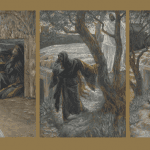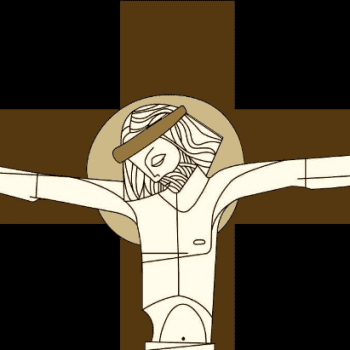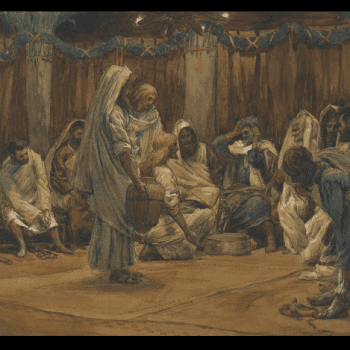
As each of the major days of Holy Week draws near, I will add to this post, so please bookmark it. I am a freelance writer in California, where a state law prohibits a media organization like Patheos from publishing more than thirty-four posts per year from a freelance writer. So I am making separate new posts here only about once every ten days.
FOR THE MASS OF THE FIFTH SUNDAY OF LENT
Ezekiel 37:12-14. Romans 8:8-11. John 11:1-45.
The readings and prayers in today’s Mass promise us our resurrection.
Through our Baptism, our Anointing in Confirmation, and our Eucharistic Communion, we receive God’s Spirit that marks us for rising from the dead.
If we choose to stay faithful by working together with the Spirit, then the Father who raised Christ from the dead will give everlasting joy and life to our earthly bodies through his Spirit.
But even with the glory of that promise, suffering still shakes us.
Even though Christ was to raise Lazarus from the dead, suffering still shook Christ so that he groaned in the spirit and wept for Lazarus.
Today Christ called himself the Son of God while foretelling that in Lazarus death would give way for the glory of God, that the Son of God may be glorified through it.
Then Christ also spoke of an odd joy, telling his disciples: Lazarus has died…. I am GLAD for you that I was not there, that you may believe.
On the way to raise Lazarus, Christ met the dead man’s sister, Martha, and he spoke as God to her: I AM THE RESURRECTION AND THE LIFE.
He took hold of Martha’s faith and squeezed out more than she had yet said: … whoever believes in ME, even if he dies, will live. Do you believe this?
Telling his disciples his own glory as Son of God, telling them his gladness that they would have faith from seeing his glory that day, telling Martha his own Godhood, knowing fully his own Godly glory and not shying to speak it into the faces of men and women, Christ still opened himself to suffering today.
And Jesus wept.
Twice today the original Greek of the Gospel says Christ groaned in the spirit inside himself.
Even though Christ is God the Son and was there to raise Lazarus from the dead, he knows human pain, and it stabs him deeply as today’s Gospel shows.
Today’s Gospel is rich with the human feelings of Christ: his affection for his friends; his gladness for the faith of his disciples; his sorrow in the face of death.
All the same, his own Godhood, his knowledge of it, his open words of it and his outright hunt for people’s faith in it are also lively in today’s Gospel.
True God and True Man— Christ is all; his Father sent him; he wanted people to know it.
And Jesus raised his eyes and said,
“Father, I thank you for hearing me.
I know that you always hear me;
but because of the crowd here I have said this,
that they may believe that you sent me.”
He wanted the crowd to believe the heavenly Father sent him.
Today in the Gospel, the heavenly Father sent him to the open mouth of death with its rot and stench.
Raising his eyes to heaven, Christ did not ask the FATHER to raise Lazarus from the dead.
Rather, Christ had already called HIMSELF the Resurrection and the Life whom the Father sent from heaven.
God-the-Resurrection-and-the-Life-in-Person stood up to a rotting corpse and did something imperial but also laughable and insane: he shouted at a dead man, he cried out in a loud voice.
In the original Greek of the Gospel, the word for the shouting of Christ today is the same as for the shouting of the Palm Sunday crowd and the Good Friday crowd.
On Palm Sunday, the shouting was full of joyful worship: Hosanna!
On Good Friday, the shouting was full of deadly condemnation: Crucify him!
What feelings filled the shouting of Christ in today’s Gospel?
Was it the gladness he spoke of, the gladness of letting his disciples see and believe?
Did the shouting of Christ today come out of that deep place inside him that shook with pain and groaned in the spirit?
Did he shout from anger at ancient sin that brought death into our infant race, and did he shout from anger that death swallowed his friend?
If you and I claim that Christ loves us as he loved Lazarus, Martha, and Mary, if we claim he loves us, mustn’t we also claim that he shouts at us when he finds us dead in sin?
What could his feelings, his will as God, his will as man, and his shouting do for the dead, rotting eardrums of Lazarus?
Would the lifeless, stinking ears take heed?
“Lazarus, come out!”
The dead man came out,
tied hand and foot with burial bands,
and his face was wrapped in a cloth.
If a dead man came to life in obedience to Christ, could we sinners also come to life in obedience to Christ?
In our having freely chosen to give in to our sins, perhaps we need to lay claim to the SHOUTING of Christ, so that he may have our OBEDIENCE.
Or is our version of Christ not daring enough to shout at us?
Or would we REJECT a Christ who is God and wild enough to shout at us?
And then would we shout “Crucify him!” back at him?
Would we not prefer to be filled with his Spirit so as to shout, “Hosanna!” precisely because we saw and heard him shouting in his Godliness and his wild daring, shouting loudly enough to raise a rotting dead man back to life?
Christ shouts for anger, joy and sorrow.
He is the shouting voice and word of the heavenly Father.
One prayer [the Preface] of today’s Mass will say of him:
as true man he wept for Lazarus his friend
and as eternal God raised him from the tomb,
just as, taking pity on the human race,
he leads us by sacred mysteries to new life.
If we want new life, let us hunt down sin in our lives and stop it.
We have come to the altar today to hear the God-Man shouting at us by way of the mystery of giving up for us his Sacred Body and Blood for the forgiveness of sins.
Heeding the shout of his Body and Blood, let us leave behind the dark tomb of our sins.
Turn. Love. Repeat.
For Thursday of the Fifth Week of Lent
I Swear to God

Today we hear Christ pronounce the words of a binding promise: Amen, amen, I say to you, whoever keeps my word will never see death.
Some who heard Christ speak these words challenged him, asking, in effect, “Just who do you think you are, claiming as you do that no one who keeps YOUR words shall ever know death?”
Christ answers this question for them in two steps.
The first step in Christ’s answer goes like this:
I know the Father, your God. Yes, I know him well, and I keep his word.
In the second step in his answer Christ gives himself the name of God:
Amen, amen, I say to you, before Abraham came to be, I AM.
People recognized this as criminal and vulgar blasphemy spoken at the very house of God.
So, they picked up stones, since the law from God required that a blasphemer be put to death by stoning.
Had you and I been there, Christ’s words would have shocked us as well, were it not that we have received the gift of faith to see, know and bow down before the meaning of his words.
Christ knows the Father, the God of Abraham.
Christ keeps the word of God, and cannot do otherwise, because he IS the Word of God— the Word of God alive as a man of flesh and blood.
He is God revealing God to us.
Our faith in THIS revelation— our faith in THIS WORD— opens for us the way to never-ending life.
In the Eucharist, God gives his Word— his Promise— in his own Flesh and Blood.
However, he does so while expecting us to enter the Promise with him.
Amen, amen, I say to you, whoever KEEPS my word will never see death.
When we say “Amen” to the Eucharist of Christ, we are agreeing to keep his word.
We swear to God in the Eucharistic Christ to give up our bodies for him and to pour out our blood for him.
How could it be otherwise as we expect him to do that for us in his Eucharist?
Turn. Love. Repeat.
For Palm Sunday of the Passion of the Lord
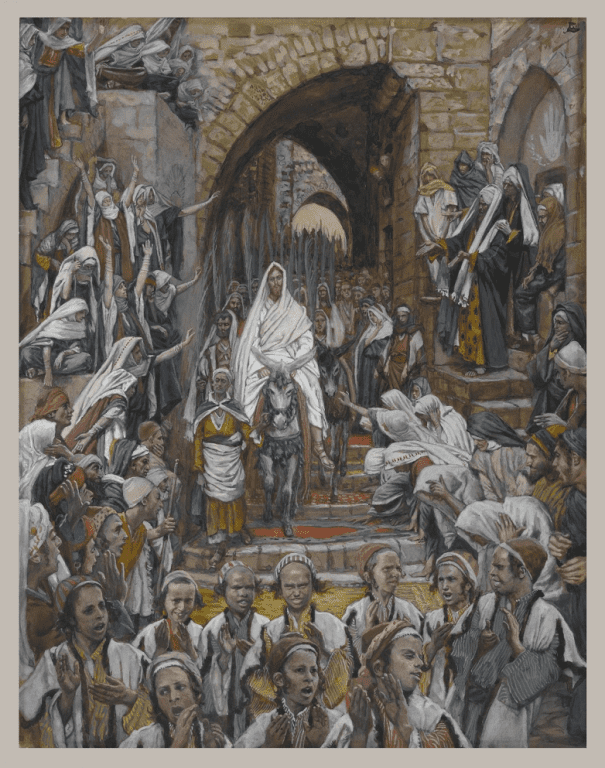
Today in his Gospel, Christ has us witness again his suffering and death on the cross.
Already last week at daily Mass, the prayer called the “preface” spoke to our heavenly Father of the suffering and death of Christ on the cross.
For through the saving Passion of your Son the whole world has received a heart to confess the infinite power of your majesty, since by the wondrous power of the Cross your judgment on the world is now revealed and the authority of Christ crucified.
The prayer speaks of the Passion, the suffering of Christ crucified, but also of power, majesty and authority.
It is a paradox to speak of power, majesty and authority coming from suffering.
Furthermore, our faith and prayer acclaim the untold paradox of the suffering unto death of one who is GOD.
How may we find power, majesty and authority through the cross, while in our own lives we yet suffer and die?
Christ said:
If you continue in my word, you are truly my disciples, and you will know the truth, and the truth will make you free. Truly, truly, I say to you, every one who commits sin is a slave to sin. [Cf. Jn. 8:31-34]
Christ sets truth and freedom against sin and slavery.
He says the truth will make us free, while sin makes us its slaves.
But was Christ free when Pilate handed him over to death, when soldiers pounded nails through his body, and when he sagged from those nails on the cross?
It would be easy to answer that he was going to rise from the dead anyway.
But that answer ignores the truth and freedom that appear and are present on the cross itself.
On the cross, God who is Love abandons himself absolutely to freedom from self-concern.
Love gives away its all on the cross.
Love that does not need anyone to give love back!
God who is Love began to live as a man some two thousand and twenty years ago.
With that birth, human flesh and blood, a human mind and heart began to be the sign, the place and the event of Love in person giving itself away.
Christ is God.
His suffering and death are the power, majesty and authority of the Divine Love freely giving himself up and away in human flesh and blood.
In THIS world, one cannot ask more of love than that; and God’s love in this world would not do anything LESS than that.
The cross already shows and gives to the world God’s power, majesty and authority, God’s truth, freedom and love.
In the flesh and blood of Christ, the world of flesh and blood is set free from slavery, sin, suffering and death by rising from the dead, swollen with all the power, majesty and authority of God’s Holy Spirit of truth and freedom and love.
The truth is that God made us human beings for happiness and freedom in knowing and loving God and in loving as God loves.
God wants to swell every fiber of our being, heart, soul, mind and strength.
God wants to swell every fiber of our being with his Spirit of Truth and Freedom and Love.
He gives us that Spirit in the same flesh and blood that received birth in Bethlehem, death outside Jerusalem and everlasting resurrection in a garden.
And so Christ says:
If you continue in my word, you are truly my disciples, and you will know the truth, and the truth will make you free.
The Word of the Lord tells us:
God our savior desires all men to be saved and to come to the knowledge of the truth: there is one God and one mediator between God and men… Christ Jesus who gave himself as a ransom for all. [1 Tim. 2:4‑6]
Our ransom in person in flesh and blood is now our Eucharistic Food and Drink.
Turn. Love. Repeat.
FOR HOLY THURSDAY
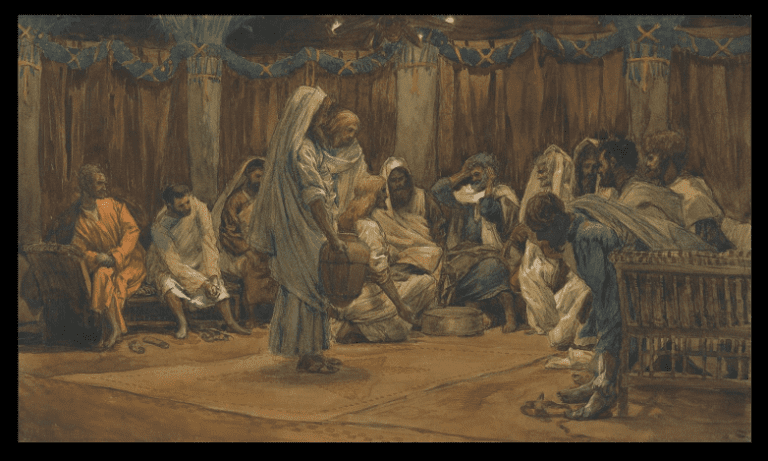
Exodus 12:1-8,11-14. 1 Corinthians 11:23-26. John 13:1-15.
In the days of Christ, his countrymen would never ask any fellow Hebrew, free or slave, to wash the feet of anyone.
That job could go only to a slave from a foreign race.
The Gospel today does not tell us merely that Christ gave himself that chore.
Rather, the Gospel carefully introduces the INDIGNITY of the job of washing feet by first reciting the immeasurable DIGNITY of Christ.
… Jesus knew that his hour had come to pass from this world to the Father.
So, during supper,
fully aware that the Father had put EVERYTHING into his power
and that he had come FROM GOD and was returning TO GOD….
We echo the same dignity in our Creed every Sunday, saying that Christ is “GOD FROM GOD, LIGHT FROM LIGHT, TRUE GOD FROM TRUE GOD.”
By choosing to wash the feet of his chosen followers, HOLY-GOD-IN-THE-HIGHEST gave himself the work of a foreign slave: he volunteered to serve as an outcast without dignity, an outsider beneath his own followers.
This does not turn only the WORLD upside down.
It turns GOD upside down: the All-Holy Creator disowning himself and enslaving himself to his sinful creatures.
To sin is to trample under our feet the goodness and honor of God.
By washing the sinful feet of his apostolic church, Christ is already explaining his cross to us.
Sin rejects God.
God allows the rejection to go all the way to the cross.
He accepts betrayal at the hands of one of the first handpicked Christians.
The other eleven handpicked first Christian men abandoned God to his chosen suffering.
God to whom all sacrifice and worship are owed then accepts to be rejected by his own high priest, condemned by the elders of his nation, shoved outside the gates of his own holy city, handed over to the Roman representatives of the world who abuse, torture and crucify him.
Jews, Christians, pagans— the whole world reveals its guilt.
They know not what they do.
God knows what he is doing.
He came into the human race.
As a member of the human race, in the name of the human race, at the head of the human race, within the human race: God as a man took the lowest place.
His willing death on the cross receives meaning when Christ washes the feet of sinners.
The meaning is continued and deepened in another unbelievable sign.
… the Lord Jesus, on the night he was handed over,
took bread, and, after he had given thanks,
broke it and said, “This is my body that is for you.
Do this in remembrance of me.”
In the same way also the cup, after supper, saying,
“This cup is the new covenant in my blood.
Do this, as often as you drink it, in remembrance of me.”
For as often as you eat this bread and drink the cup, you proclaim the death of the Lord until he comes.
All sacrifice and worship are owed to God.
Yet he offers his body and his blood— slaughtered and poured out— as food for sinners who deny him the love and honor that are his first of all.
As a foreign slave washing feet, as a criminal condemned to death, even as food and drink, he chooses to put himself at the disposal of the human race.
Having gone lower than the human race, while being a member of the human race, God is now in a position to personally take the human race from miserable death at the bottom to glory in the highest.
Christ rises from the dead and into heaven as a member of the human race, in the name of the human race, at the head of the human race, within the human race.
In Christ risen and ascended, the human race is seated at the right hand of God the Father almighty.
In his Body and Blood, Christ lets us eat and drink the dignity of God himself.
What have we done to deserve this?
Nothing!
What can we do to deserve this?
Nothing!
Without deserving it, and without being able to deserve it, we are to imitate it.
We are to imitate the Divine Slave, imitate the sinless washer of sinful feet, imitate the one who slaughters himself to be our food and drink.
This night he tells us:
Do this in remembrance of me.
If I, therefore, the master and teacher, have washed your feet,
you ought to wash one another’s feet.
I have given you a model to follow,
so that as I have done for you, you should also do.
This night, as at every Eucharist, we renew the Covenant of Christ, choosing to say “Amen,” thereby binding ourselves to serve and imitate the Holy One who has bound himself as the slave, scapegoat, banquet and savior of sinners.
Turn. Love. Repeat.
FOR GOOD FRIDAY
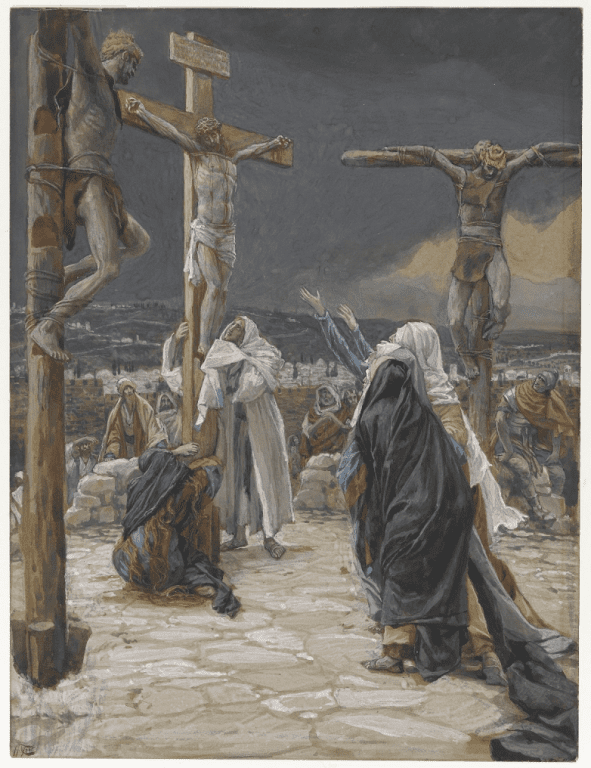
Elsewhere in his Gospel, Christ describes himself as the Man who is the King of Glory, King of Angels and King of All Nations.
On Palm Sunday, we saw him enter Jerusalem the city of God, with the crowds acclaiming Christ as messiah, king and savior.
On Easter Sunday, the Resurrection, Christ risen from the dead re-enters Jerusalem as the forever-invincible King of Life.
But today we commemorate his suffering, death, and burial.
We believe in him: King of Glory, King of Angels, King of All Nations, Anointed One, Savior, Risen and Invincible King of Life.
Eternal, Almighty God came to earth to be a man of flesh and blood, to live as a member of the human race, to suffer because we suffer, to die because we die.
His complete solidarity with us in life and death is a great sign of his goodness.
There is more.
Though entirely innocent, he chose to shoulder the responsibility for all human sin from the first to the last.
Sin— the primordial cause of all that is broken or evil in the universe!
The paradox is that God should not have to shoulder that responsibility.
The paradox is also that God alone could shoulder by choice such a responsibility.
Shouldering the responsibility for all human sin from the first to the last, and shouldering all that is broken and evil in the universe, Christ made all of it die in his own death.
His death wiped clean the slate of sin-laden human history so there could be a new beginning.
There is more.
He rose from the dead.
He— God— rose from the dead still a man—but unimaginably different and unimaginably new.
He rose from the dead still in solidarity with the human race, but having carried the human race through sin and death, having carried the human race in himself beyond into a new life and into holiness.
By coming into the human race, dying as the human race, and rising in the name of the human race, Christ gives us power and possibility for life without end and joy without limit.
It is a test for our faith that we may not see the victorious end of our destiny until the fulfillment of the world.
Yet we believe it.
Though Christ shouldered all our responsibility, he does not leave us without responsibility.
In answer to his goodness, we are to follow him.
As he took on all our suffering, we must answer by carrying all who suffer.
In his Gospel, Christ expects us to answer his goodness by our doing good to all who suffer.
Come, you who are blessed by my Father.
Inherit the kingdom prepared for you from the foundation of the world.
For I was hungry and you gave me food,
I was thirsty and you gave me drink,
a stranger and you welcomed me,
naked and you clothed me,
ill and you cared for me,
in prison and you visited me.
Amen, I say to you,
whatever you did
for one of these least brothers of mine,
you did for me. [Mt. 25]
It is not enough for us to have faith in the goodness of the Lord.
He holds us accountable for giving an answer to his goodness by being good ourselves to others.
In the goodness of his Eucharist, he tells us to do the same.
Do this in memory of me.
Turn. Love. Repeat.
FOR HOLY SATURDAY
Second Hand Son, Brother of Jesus
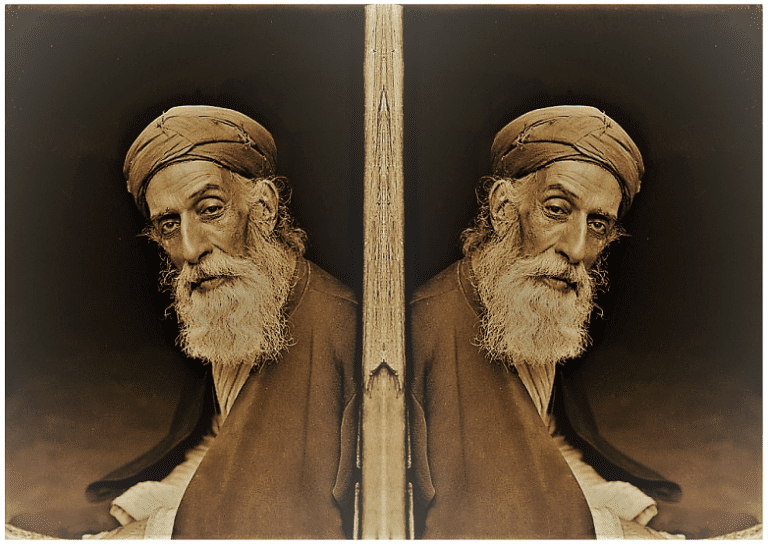
John 18:1 to 19:42
The Passion of Our Lord Jesus Christ according to John
Jesus.
Now and at the hour of his death, what has changed?
What is new for me as his disciple?
What am I to do?
From his cross he told me only one thing:
“Behold, your mother.”
Then, as the Gospel says:
from that hour the disciple took her into his home.
What is it to have her in my home and my life?
At Cana in Galilee, she was the Gospel’s first witness of the misery of man and woman.
Having seen it, she stepped in.
She already believed in her son.
She prayed:
“They have no wine.”
Then she stood with her son’s would-be servants, and told them:
“Do whatever he tells you.”
Water became wine.
I saw.
I believed.
I wanted to do whatever he told me.
I followed him.
When the soldiers and police arrested him, we, his handpicked men, ran away.
His mother went to his cross.
I crept out of hiding, and stood in her shadow.
When Jesus saw his mother and the disciple whom he loved standing beside her, he said to his mother, “Woman, behold your son.”
Then he said to the disciple, “Behold your mother.”
And from that hour the disciple took her into his own home.
I changed from runaway disciple into brother of Jesus and second-hand son of Mary.
Water into wine again!
The only thing Jesus said to me from his cross:
“Behold, your mother.”
That’s all.
From his cross, from him, from that hour I took his mother into my home and my life.
I beheld her.
I behold her now.
At both Cana and Calvary, she intervened.
At Cana, Jesus yielded to her.
This, the first of his signs, Jesus did at Cana in Galilee,
and manifested his glory; and his disciples believed in him.
The last of his signs was on Calvary where he changed me into his brother, and said,
“It is finished.”
Mother of Jesus!
My mother!
Behold me.
I yield to you.
Draw me out of my hiding, and walk me to his cross.
Stay with me.
Teach me to keep the Sabbath.
Teach me to wait for the glory of Jesus Arisen to break into all the locked rooms where I hide now and at the hour of my death.
Turn. Love. Repeat.
I will have a new, separate post for Easter Sunday.
Dear Readers of “Turn. Love. Repeat.”
California where I reside had a new law go into effect on January 1, 2020. California Assembly Bill 5 forbids freelance writers, editors and photographers from providing more than 34 content submissions to a media organization per year unless the organization hires the freelancer as a salaried employee. Patheos is a media organization, and I am a freelancer. So now I must limit my posts to 34 per year, or 1 post about every 10 days.
So as not to exceed my legal limit, between my postings here at Patheos I will publish my “extra” pieces at my personal blog, Monk Notes.


